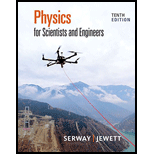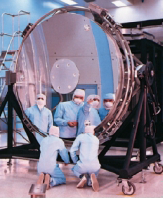
Physics for Scientists and Engineers
10th Edition
ISBN: 9781337553278
Author: Raymond A. Serway, John W. Jewett
Publisher: Cengage Learning
expand_more
expand_more
format_list_bulleted
Concept explainers
Textbook Question
Chapter 35.2, Problem 35.3QQ
Consider the image in the mirror in Figure 35.14. Based on the appearance of this image, would you conclude that (a) the mirror is concave and the image is real, (b) the mirror is concave and the image is virtual, (c) the mirror is convex and the image is real, or (d) the mirror is convex and the image is virtual?
Figure 35.14

Expert Solution & Answer
Trending nowThis is a popular solution!

Students have asked these similar questions
Identify which of the following vectors are parallel to A.
Vector
Vector A
70°
60°
20°
AAZA!
30°
20°
20°
70°
20°
20°
70°
20°
Need help
3b
Chapter 35 Solutions
Physics for Scientists and Engineers
Ch. 35.1 - You are standing approximately 2 m away from a...Ch. 35.2 - You wish to start a fire by reflecting sunlight...Ch. 35.2 - Consider the image in the mirror in Figure 35.14....Ch. 35.3 - Prob. 35.4QQCh. 35.3 - Prob. 35.5QQCh. 35.4 - What is the focal length of a pane of window...Ch. 35.6 - Two campers wish to start a fire during the day....Ch. 35 - (a) Does your bathroom mirror show you older or...Ch. 35 - Two flat mirrors have their reflecting surfaces...Ch. 35 - A periscope (Fig. P35.3) is useful for viewing...
Ch. 35 - Two plane mirrors stand facing each other, 3.00 m...Ch. 35 - An object is placed 50.0 cm from a concave...Ch. 35 - An object is placed 20.0 cm from a concave...Ch. 35 - An object of height 2.00 cm is placed 30.0 cm from...Ch. 35 - Why is the following situation impossible? At a...Ch. 35 - A large hall in a museum has a niche in one wall....Ch. 35 - A concave spherical mirror has a radius of...Ch. 35 - An object 10.0 cm tall is placed at the zero mark...Ch. 35 - You are training to become an opticians assistant....Ch. 35 - A certain Christmas tree ornament is a silver...Ch. 35 - Review. A ball is dropped at t = 0 from rest 3.00...Ch. 35 - You unconsciously estimate the distance to an...Ch. 35 - A convex spherical mirror has a focal length of...Ch. 35 - One end of a long glass rod (n = 1.50) is formed...Ch. 35 - Prob. 18PCh. 35 - Prob. 19PCh. 35 - Figure P35.20 (page 958) shows a curved surface...Ch. 35 - To dress up your dorm room, you have purchased a...Ch. 35 - You are working for a solar energy company. Your...Ch. 35 - An object located 32.0 cm in front of a lens forms...Ch. 35 - An objects distance from a converging lens is 5.00...Ch. 35 - A contact lens is made of plastic with an index of...Ch. 35 - A converging lens has a focal length of 10.0 cm....Ch. 35 - A converging lens has a focal length of 10.0 cm....Ch. 35 - Suppose an object has thickness dp so that it...Ch. 35 - An object is placed 10.0 cm from a diverging lens...Ch. 35 - In Figure P35.30, a thin converging lens of focal...Ch. 35 - You are working for an electronics company that...Ch. 35 - Prob. 32PCh. 35 - Two rays traveling parallel to the principal axis...Ch. 35 - Josh cannot see objects clearly beyond 25.0 cm...Ch. 35 - Figure 35.34 diagrams a cross section of a camera....Ch. 35 - The refracting telescope at the Yerkes Observatory...Ch. 35 - The distance between the eyepiece and the...Ch. 35 - What are (a) the maximum angular magnification...Ch. 35 - A patient has a near point of 45.0 cm and far...Ch. 35 - The intensity I of the light reaching the CCD in a...Ch. 35 - A certain childs near point is 10.0 cm; her far...Ch. 35 - Astronomers often take photographs with the...Ch. 35 - A simple model of the human eye ignores its lens...Ch. 35 - A real object is located at the zero end of a...Ch. 35 - The distance between an object and its upright...Ch. 35 - Prob. 46APCh. 35 - Andy decides to use an old pair of eyeglasses to...Ch. 35 - Two converging lenses having focal lengths of f1 =...Ch. 35 - Two lenses made of kinds of glass having different...Ch. 35 - Prob. 50APCh. 35 - An object is placed 12.0 cm to the left of a...Ch. 35 - An object is placed a distance p to the left of a...Ch. 35 - In a darkened room, a burning candle is placed...Ch. 35 - In many applications, it is necessary to expand or...Ch. 35 - Why is the following situation impossible?...Ch. 35 - A zoom lens system is a combination of lenses that...Ch. 35 - Consider the lensmirror arrangement shown in...Ch. 35 - A floating strawberry illusion is achieved with...
Knowledge Booster
Learn more about
Need a deep-dive on the concept behind this application? Look no further. Learn more about this topic, physics and related others by exploring similar questions and additional content below.Similar questions
- 4a Which of the following values COULD NOT be a magnitude? Choose all that apply. 626 0 -0.806 8.63 -48.5 72 131 156 4b Px = -1248 & Py = 261. Determine P.P = Qx = -1540 & Qy = 375. Determine Q.Q = 4c. T = 1105 & Ty = 425. Determine the two possible values for Tx. 4d. Uy = -38. Which of the following COULD NOT be the value of U? Choose all that apply. 10 70 72 31 47 0 75 38 4e. R has a magnitude of 165. Which of the following COULD be Rx? Choose all that apply. 165 -171 155 0 -156 -165 172 -130arrow_forward9.arrow_forward10.arrow_forward
arrow_back_ios
SEE MORE QUESTIONS
arrow_forward_ios
Recommended textbooks for you
 Physics for Scientists and EngineersPhysicsISBN:9781337553278Author:Raymond A. Serway, John W. JewettPublisher:Cengage Learning
Physics for Scientists and EngineersPhysicsISBN:9781337553278Author:Raymond A. Serway, John W. JewettPublisher:Cengage Learning Physics for Scientists and Engineers with Modern ...PhysicsISBN:9781337553292Author:Raymond A. Serway, John W. JewettPublisher:Cengage Learning
Physics for Scientists and Engineers with Modern ...PhysicsISBN:9781337553292Author:Raymond A. Serway, John W. JewettPublisher:Cengage Learning Physics for Scientists and Engineers: Foundations...PhysicsISBN:9781133939146Author:Katz, Debora M.Publisher:Cengage Learning
Physics for Scientists and Engineers: Foundations...PhysicsISBN:9781133939146Author:Katz, Debora M.Publisher:Cengage Learning College PhysicsPhysicsISBN:9781305952300Author:Raymond A. Serway, Chris VuillePublisher:Cengage Learning
College PhysicsPhysicsISBN:9781305952300Author:Raymond A. Serway, Chris VuillePublisher:Cengage Learning Principles of Physics: A Calculus-Based TextPhysicsISBN:9781133104261Author:Raymond A. Serway, John W. JewettPublisher:Cengage Learning
Principles of Physics: A Calculus-Based TextPhysicsISBN:9781133104261Author:Raymond A. Serway, John W. JewettPublisher:Cengage Learning Physics for Scientists and Engineers, Technology ...PhysicsISBN:9781305116399Author:Raymond A. Serway, John W. JewettPublisher:Cengage Learning
Physics for Scientists and Engineers, Technology ...PhysicsISBN:9781305116399Author:Raymond A. Serway, John W. JewettPublisher:Cengage Learning

Physics for Scientists and Engineers
Physics
ISBN:9781337553278
Author:Raymond A. Serway, John W. Jewett
Publisher:Cengage Learning

Physics for Scientists and Engineers with Modern ...
Physics
ISBN:9781337553292
Author:Raymond A. Serway, John W. Jewett
Publisher:Cengage Learning

Physics for Scientists and Engineers: Foundations...
Physics
ISBN:9781133939146
Author:Katz, Debora M.
Publisher:Cengage Learning

College Physics
Physics
ISBN:9781305952300
Author:Raymond A. Serway, Chris Vuille
Publisher:Cengage Learning

Principles of Physics: A Calculus-Based Text
Physics
ISBN:9781133104261
Author:Raymond A. Serway, John W. Jewett
Publisher:Cengage Learning

Physics for Scientists and Engineers, Technology ...
Physics
ISBN:9781305116399
Author:Raymond A. Serway, John W. Jewett
Publisher:Cengage Learning
Convex and Concave Lenses; Author: Manocha Academy;https://www.youtube.com/watch?v=CJ6aB5ULqa0;License: Standard YouTube License, CC-BY